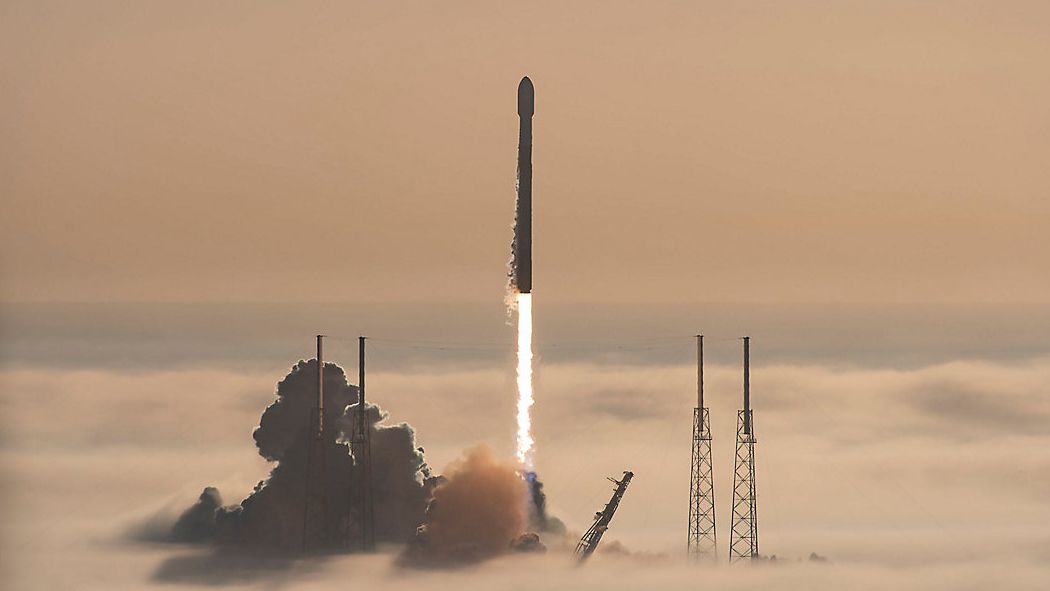CAPE CANAVERAL, Fla. — With 24 days and counting to Christmas, the Space Coast is getting the gift of several launches for its viewing pleasure.
The lion’s share of the launches this December will be conducted by SpaceX, beginning with the launch of a rideshare mission on one of its Falcon 9 rockets scheduled for Thursday evening.
What You Need To Know
- Up to five launches are expected from the Space Coast in December 2021
- Four out of the five launches will be through SpaceX
- A firm date hasn’t been announced for the launch of the Turksat 5B mission.
Originally scheduled for Wednesday, SpaceX is planning to launch more than 50 of its Group 4 Starlink satellites Thursday into its ever-growing constellation in low Earth orbit (LEO).
SpaceX has yet to conduct a static fire test of its Falcon 9 rocket at Space Launch Complex 40 at Cape Canaveral Space Force Station, but according to a tweet from Kennedy Space Center (KSC) Visitor Complex, the Starlink 4-3 launch is currently scheduled for Thursday at 6:28 p.m.
Along for the ride will be a pair of “high resolution, multi-spectral Gen-2 satellites” from BlackSky, headquartered in Herndon, Va. This will bring BlackSky’s Earth observing constellation to a total of 10 satellites in order to “enhance the company’s geospatial capacity for data while increasing revisit rates for customers.”
We're catching a ride with @SpaceX soon! Upcoming mission advances $BKSY's #geospatial data capacity, increases revisit rates for customers. #geoint #firsttoknow #constellation #newspacehttps://t.co/QOi8TlK7zc pic.twitter.com/fSAXXFHaWV
— BlackSky (@BlackSky_Inc) November 30, 2021
“Our high-revisit constellation reinforces our commitment to delivering real-time data and intelligence to our customers, which disrupts the industry status quo,” said Nick Merski, BlackSky chief operations officer, in a statement. “Our customers continue to benefit from the predictable, rapid growth of our geospatial services.”
The company is aiming to reach a 12-satellite constellation by the end of 2021. In a statement to Spectrum News 13, a spokesperson for BlackSky said that their next scheduled launch will be the “A Date with Destiny” mission aboard a Rocket Lab Electron rocket. The launch window opens at 7:40 p.m. EST on December 6.
It's starting to feel like launch week! Our next mission for @BlackSky_Inc and @SpaceflightInc is scheduled for lift-off NET 07 December UTC.
— Rocket Lab (@RocketLab) December 1, 2021
A Data With Destiny launch window opens:
🚀UTC | 00:40, Dec 7
🚀NZDT | 13:40, Dec 7
🚀ET | 19:40, Dec 6
🚀PT | 16:40, Dec 6 pic.twitter.com/oFve4ZWYBX
Seattle-based Spaceflight Inc., a launch services and mission provider, is coordinating both the SpaceX and Rocket Lab missions for BlackSky. It signed a multi-launch agreement with BlackSky in January 2021.
“We then worked with the various [launch vehicles] to find availability and destination fit, followed by the mission management and integration work to meet BlackSky’s preferred timing needs,” said a spokesperson for Spaceflight Inc. “This SpaceX Starlink mission was solidified in the June 2021 time frame.”
This ride share mission was dubbed SXRS-2 by Spaceflight Inc. Because the BlackSky satellites are a secondary rideshare, they will be “launched prior to the Starlink deployment, to 430 km 53 degrees inclination.”
Their last launch with BlackSky took place on an Electron rocket (RL-8) on Nov. 17.
Taking customers to space never gets old. We're thrilled to be taking @BlackSky_Inc to space again, as they continue to build their constellation. Launch is early December! #SXRS2 #Starlink https://t.co/1qs6iow7DE
— Spaceflight (@SpaceflightInc) November 30, 2021
“Creating a constellation on orbit requires frequent and reliable launches, and that’s what we provide for BlackSky and many other customers,” said Marcy Mabry, Spaceflight’s mission director for SXRS-2 said in a press release. “We’re continually working on their behalf to not only find the most appropriate and cost-effective launch that meets their needs, but we’re uniquely positioned to provide the mission planning and integration services because of our years of experience working with the various launch vehicles.”
BlackSky previously launched on a SpaceX Falcon 9 rocket in 2018 and 2020.
Busy month ahead
The pending launch of the SpaceX rideshare mission will kick off a busy month for both KSC and Cape Canaveral Space Force Station.
Just a few days after the Starlink 4-3 launch, United Launch Alliance (ULA) will launch the Space Test Program (STP)-3 mission for the U.S. Space Force on Sunday, December 5. The mission will launch the STP Satellite (STPSat)-6 as the primary satellite with the Long Duration Propulsive Evolved Expendable Launch Vehicle (EELV) Secondary Paylaod Adapter (ESPA)(LDPE)-1.
NASA will use the opportunity as a part of the STPSat-6 payload to test its Laser Communication Relay Demonstration(LCRD).
The following week, NASA will launch the first satellite “dedicated to measuring the polarization of X-rays from a variety of cosmic sources, such as black holes and neutron stars.”
The IXPE (Imaging X-ray Polarimetry Explorer) mission is scheduled to launch no earlier than 1 a.m. EST on Dec. 9 from Launch Complex 39A at KSC aboard a Falcon 9 rocket.
Two more Falcon 9 rockets are also scheduled to take off this month. NASA and SpaceX are targeting Dec. 21, at 5:06 a.m. EST for the launch of the 24th Commercial Resupply Services (CRS-24) mission to the International Space Station.
And as a bookend to the start of the year, one of the last SpaceX launches in 2021 will be the launch of the Turksat 5B satellite. SpaceX launched Turksat 5A back on Jan. 7, which was the first launch of the calendar year. A definitive date on the Turksat B launch hasn’t been announced, but it is expected to launch from Space Launch Complex-40 at Cape Canaveral Space Force Station.



